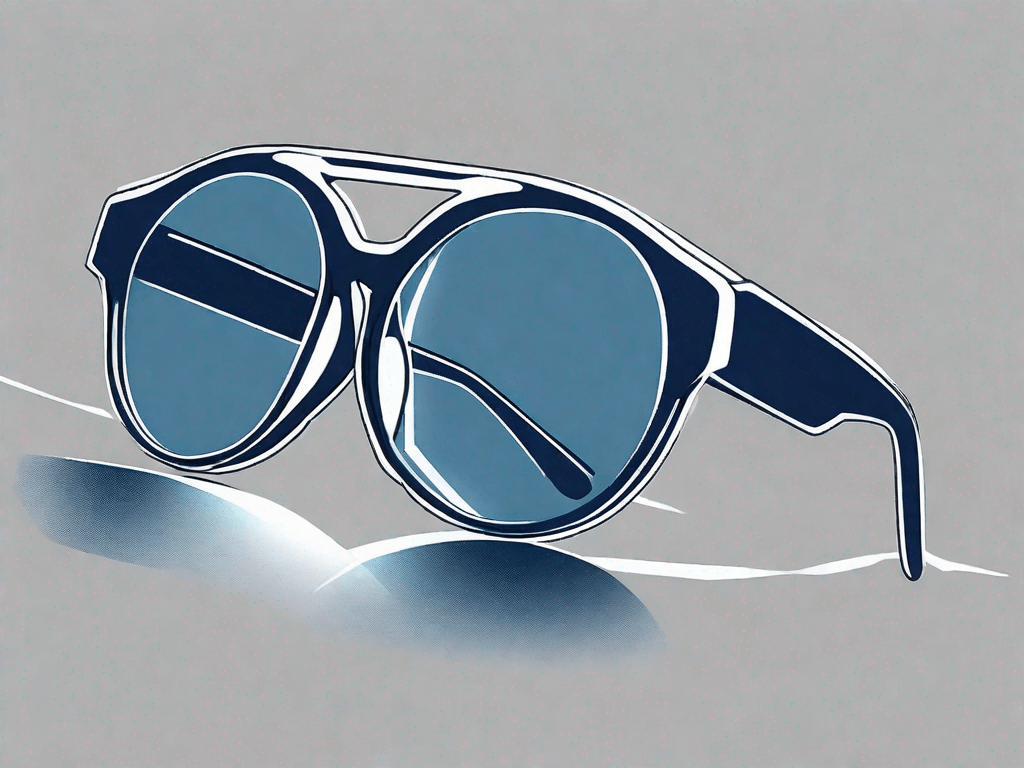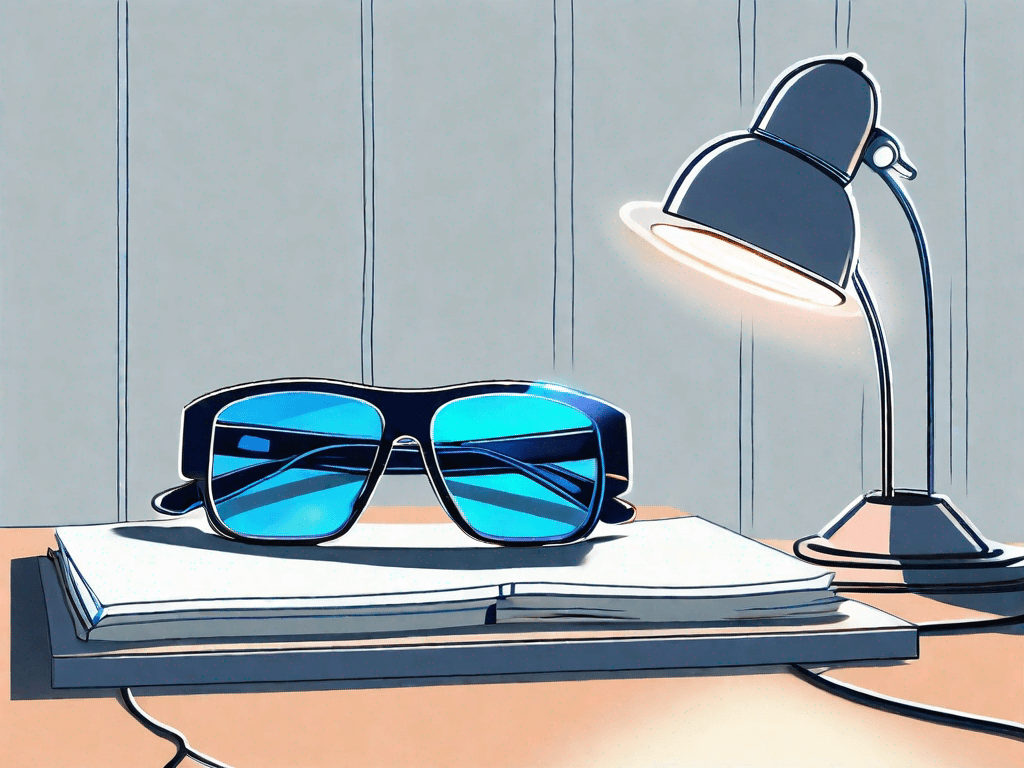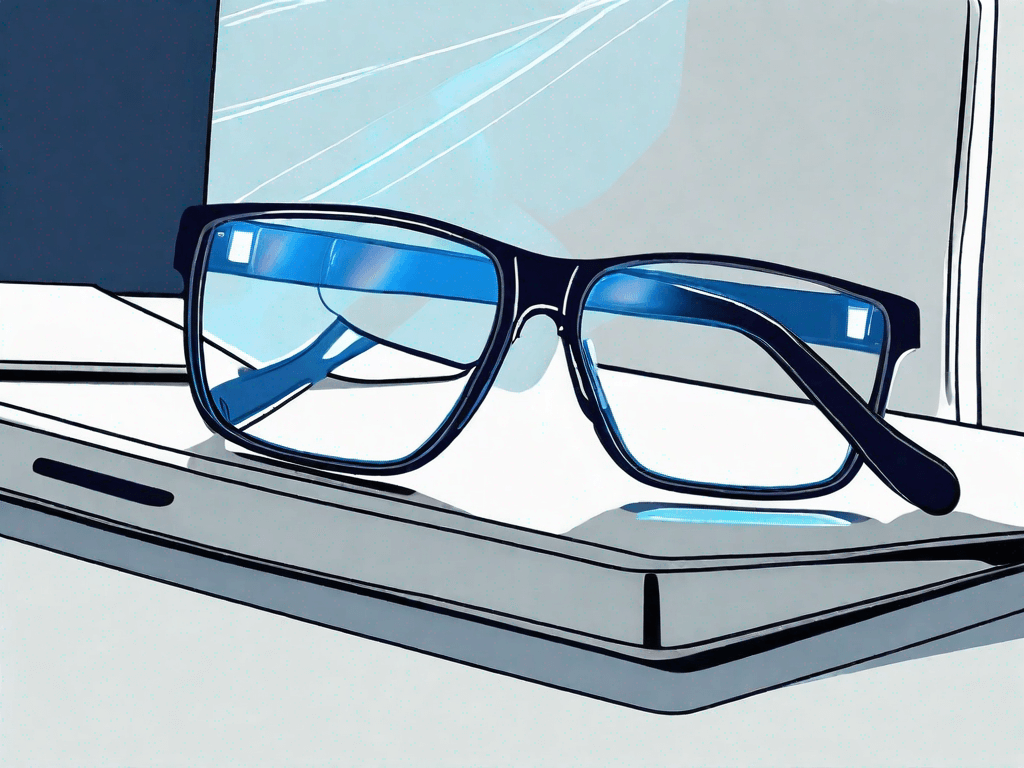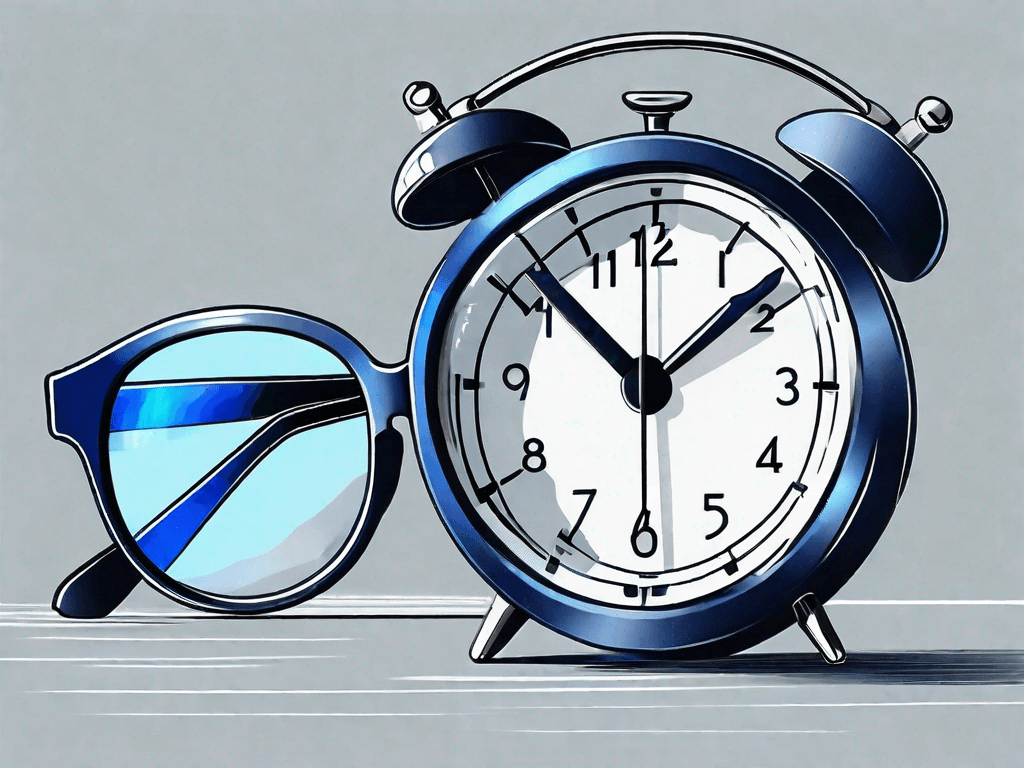How to Tell If Your Glasses Block Blue Light
Blue light has gained a lot of attention in recent years due to its potential negative effects on eye health. With the increasing amount of time we spend in front of screens, it's no wonder that people are looking for ways to protect their eyes. One popular solution is blue light blocking glasses. But how do you know if your glasses actually block blue light? In this article, we will explore the basics of blue light and how to tell if your blue light glasses work, and how to identify glasses that effectively block blue light.
Understanding the Basics of Blue Light
Before we dive into the specifics of blue light blocking glasses, let's first understand what blue light is. Blue light is a high-energy, short-wavelength light that is emitted by digital screens, LED lights, and the sun. It is a natural part of the light spectrum and plays a crucial role in regulating our sleep-wake cycle.
However, prolonged exposure to blue light, especially during nighttime, can have detrimental effects on our eyes. It can contribute to eyestrain, fatigue, and even disrupt our sleep patterns. With the widespread use of electronic devices, it's no wonder that concerns about blue light are on the rise.
What is Blue Light?
Blue light is a type of visible light with a short wavelength and high energy. It is found in natural sunlight, as well as in artificial light sources like digital screens, LED lights, and fluorescent bulbs.
When we think of blue light, we often associate it with the bright blue glow emitted by our smartphones, tablets, and computer screens. However, blue light is not limited to these devices. It is also present in the sunlight that we are exposed to every day.
Blue light is a double-edged sword. On one hand, it is essential for our well-being. It helps regulate our circadian rhythm, which is our body's internal clock that controls our sleep-wake cycle. Exposure to blue light during the day can help us stay alert and awake.
On the other hand, excessive exposure to blue light, especially at night, can have negative consequences. Our bodies are naturally programmed to wind down and prepare for sleep as the day turns into night. However, the blue light emitted by our electronic devices can disrupt this natural process.
The Impact of Blue Light on Your Eyes
When blue light enters our eyes, it can reach the retina and potentially cause damage to the cells. Prolonged exposure to blue light may contribute to digital eye strain, dry eyes, and even age-related macular degeneration.
Digital eye strain, also known as computer vision syndrome, is a common condition that affects people who spend long hours in front of digital screens.
Symptoms include:
- eyestrain,
- headaches,
- blurred vision,
- and dry eyes.
The blue light emitted by these screens can exacerbate these symptoms, making it even more uncomfortable for individuals.
In addition to digital eye strain, prolonged exposure to blue light can also increase the risk of developing age-related macular degeneration (AMD). AMD is a leading cause of vision loss in older adults and affects the macula, the part of the retina responsible for central vision. Studies have shown that blue light can cause oxidative stress to the retinal cells, leading to the development and progression of AMD.
It's important to note that not all blue light is harmful. As mentioned earlier, blue light is a natural part of the light spectrum and plays a crucial role in regulating our sleep-wake cycle. The key is to strike a balance and minimize excessive exposure to blue light, especially during nighttime.
One way to protect our eyes from the harmful effects of blue light is by using blue light blocking glasses. These glasses are specially designed to filter out a portion of the blue light emitted by digital screens and other artificial light sources.
By wearing blue light blocking glasses, you can reduce the amount of blue light that reaches your eyes, potentially alleviating symptoms of digital eye strain and promoting better sleep.
The Science Behind Blue Light Blocking Glasses
Now that we have a better understanding of blue light, let's explore how blue light blocking glasses work. These glasses are specially designed to filter out blue light, preventing it from reaching your eyes.
Blue light blocking glasses feature lenses that have a special coating, which selectively blocks a portion of blue light. The coating uses advanced technology to reflect and absorb blue light before it can reach your eyes. This helps to reduce the potential negative effects of blue light on your eyes.
But how exactly does this coating work? The coating is made up of tiny particles that are embedded in the lens material. These particles are designed to selectively filter out blue light wavelengths while allowing other wavelengths, such as red and green, to pass through. This selective filtering helps to reduce the overall amount of blue light that reaches your eyes.
When blue light enters the lens, it encounters these particles, which act as tiny obstacles. The particles reflect and scatter the blue light, preventing it from passing through the lens and reaching your eyes. Some of the particles also absorb the blue light, converting it into heat energy.
It's important to note that not all blue light is bad for you. In fact, some blue light is essential for regulating your sleep-wake cycle and boosting your mood and alertness during the day. Blue light blocking glasses are designed to filter out the excessive and potentially harmful blue light emitted by digital screens, LED lights, and other sources.
Different Types of Blue Light Blocking Glasses
There are different types of blue light blocking glasses available on the market.
Some glasses have a yellow or amber tint, while others have clear lenses with a blue light filtering coating. The color of the lens does not affect the effectiveness of the blue light blocking capabilities.
The yellow or amber tinted glasses are often preferred by individuals who spend a lot of time in front of screens, as they provide a higher level of blue light filtration.
These glasses are particularly useful for those who experience:
- eye strain,
- headaches,
- or sleep disturbances due to excessive screen time.
On the other hand, clear lenses with a blue light filtering coating are a popular choice for individuals who want the benefits of blue light protection without altering the color perception. These glasses are suitable for everyday use and can be worn indoors and outdoors.
It's worth mentioning that blue light blocking glasses are available in various styles, including prescription glasses, reading glasses, and sunglasses. This means that individuals with vision correction needs or those who want to protect their eyes while enjoying outdoor activities can also benefit from blue light blocking technology.
In conclusion, blue light blocking glasses work by selectively filtering out blue light wavelengths, reducing the potential negative effects of blue light on your eyes. Whether you choose yellow-tinted glasses or clear lenses with a blue light filtering coating, these glasses can help alleviate eye strain and improve your overall visual comfort in today's digital world.
Identifying Blue Light Blocking Glasses
With so many options available, let's have a look at how to tell if your glasses block blue light. Firstly, it's important to know how to identify glasses that effectively block blue light. Here are a few things to look out for:
Physical Characteristics of Blue Light Blocking Glasses
Blue light blocking glasses are typically labeled as "blue light blocking" or "blue light filtering." Look for these labels when purchasing your glasses. Additionally, the lenses may have a blue light coating, which can sometimes have a noticeable reflection when light hits them at certain angles.
When it comes to the frames, blue light blocking glasses can come in a variety of styles and materials. Some glasses have a sleek and modern design, while others have a more classic and timeless look. The frames can be made of different materials such as plastic, metal, or even wood. Choose a frame that not only suits your personal style but also provides a comfortable fit for extended use.
Another physical characteristic to consider is the size of the glasses. Blue light blocking glasses come in different sizes to accommodate various face shapes and sizes. It's important to choose a size that properly fits your face to ensure optimal comfort and effectiveness in blocking blue light.
Testing Your Glasses for Blue Light Blocking Capabilities
If you already have a pair of glasses and are unsure if they block blue light, there are a few simple tests you can do. One test involves using a blue light-emitting device and observing if the glasses reduce the intensity of the blue light. This can be done by placing the glasses in front of the device and comparing the brightness of the light with and without the glasses. If the glasses effectively block blue light, you should notice a significant reduction in brightness.
Another test involves looking at a white surface with your glasses on and noting if there is a visible yellow or amber tint. Blue light blocking glasses often have a yellow or amber tint to the lenses, which helps filter out blue light. When looking at a white surface, the lenses should appear slightly yellow or amber in color. If the lenses appear clear or do not have a noticeable tint, they may not effectively block blue light.
It's important to note that these tests can provide a general indication of a glasses' blue light blocking capabilities, but they may not be 100% accurate. For a more precise assessment, you can consult with an eye care professional who can evaluate the glasses using specialized equipment.
By considering the physical characteristics and conducting simple tests, you can identify blue light blocking glasses that suit your needs and provide effective protection against the potential harmful effects of blue light.
Misconceptions About Blue Light Blocking Glasses
There are several misconceptions surrounding blue light blocking glasses. It's important to separate fact from fiction. Here are a few common myths debunked:
Blue light blocking glasses have gained popularity in recent years due to the increasing use of digital devices. However, there are still some misconceptions that need to be addressed.
Common Myths Debunked
- Blue light blocking glasses make screens easier to read: While these glasses can reduce glare, they do not enhance the sharpness or clarity of screens. The primary purpose of blue light blocking glasses is to minimize the potential negative effects of blue light on our eyes, such as eye strain and fatigue.
It's important to note that the effectiveness of blue light blocking glasses may vary depending on the specific lens technology used. Some glasses may have a yellow tint, while others have a clear coating. Both types can offer protection against blue light, but the degree of effectiveness may differ.
- Blue light blocking glasses are only needed at night: Blue light is present throughout the day, so wearing blue light blocking glasses during the day can also be beneficial. Our exposure to blue light is not limited to artificial sources, such as smartphones and computers, but also natural sources like the sun. Wearing blue light blocking glasses during the day can help reduce eye strain and potential long-term effects of blue light exposure.
Furthermore, blue light emitted by screens can disrupt our sleep-wake cycle, even during the day. By wearing blue light blocking glasses, we can minimize the impact of blue light on our circadian rhythm and promote better sleep patterns.
- Blue light blocking glasses are only for people with existing eye conditions: While individuals with existing eye conditions, such as macular degeneration or cataracts, may benefit greatly from blue light blocking glasses, they are not exclusively designed for them. Anyone who spends a significant amount of time in front of screens can benefit from blue light blocking glasses.
Whether you are a student, professional, or simply someone who enjoys spending time on digital devices, blue light blocking glasses can help reduce eye strain, dryness, and potential long-term effects of blue light exposure. They act as a preventive measure to protect our eyes from the harmful effects of blue light.
What Blue Light Glasses Can and Can't Do
- Blue light blocking glasses can reduce the potential negative effects of blue light on your eyes. By filtering out a portion of blue light, these glasses can help alleviate eye strain, dryness, and fatigue that often accompany prolonged screen use.
Moreover, some studies suggest that blue light exposure may contribute to the development of age-related macular degeneration. Blue light blocking glasses can help mitigate this risk by reducing our overall exposure to blue light.
- Blue light blocking glasses cannot completely eliminate all blue light. While these glasses can significantly reduce our exposure to blue light, they do not eliminate it entirely. It's important to remember that not all blue light is harmful; our bodies require a certain amount of blue light for regulating our sleep-wake cycle and overall well-being.
Therefore, blue light blocking glasses aim to strike a balance by reducing excessive blue light exposure without completely cutting it off. This allows us to enjoy the benefits of digital devices while minimizing the potential negative impact on our eyes.
- Blue light blocking glasses are not a cure for existing eye conditions. While these glasses can provide relief from symptoms associated with digital eye strain, they do not cure underlying eye conditions. If you have a pre-existing eye condition, it's crucial to consult with an eye care professional for appropriate diagnosis and treatment.
Blue light blocking glasses should be seen as a preventive measure rather than a solution for existing eye conditions. They can help reduce the strain on our eyes caused by prolonged screen use, but they do not replace the need for regular eye exams and proper eye care.
Choosing the Right Blue Light Blocking Glasses
Now that you know what to look for in blue light blocking glasses, here are a few factors to consider when buying:
Factors to Consider When Buying
- Quality of the lenses: Look for reputable brands that use high-quality materials for their lenses.
- Comfort and fit: Make sure the glasses fit well and are comfortable to wear for extended periods.
- Style and design: Choose a pair that you feel confident wearing, as you will likely be using them regularly.
Tips for Maintaining Your Blue Light Glasses
To keep your blue light glasses in good condition, follow these tips:
- Store your glasses in a protective case when not in use to prevent scratches.
- Clean your glasses regularly using a lens cleaning solution and a microfiber cloth.
- Avoid using abrasive materials or harsh chemicals when cleaning your glasses.
Conclusion: The Importance of Protecting Your Eyes from Blue Light
With the increasing use of digital devices, protecting our eyes from blue light is more important than ever. Blue light blocking glasses offer a solution to reduce the potential negative effects of blue light on our eyes. By understanding how these glasses work and knowing what to look for when buying, you can ensure that your glasses effectively block blue light. So, take care of your eyes and invest in a pair of blue light blocking glasses today!





